Register for the next game here.
dice collection · puzzle collection | Website designed and maintained by Brandon Spacey. Not for redistribution.
7 Wonders
2-7 Players · 30 Minutes · Card / Strategy / Family
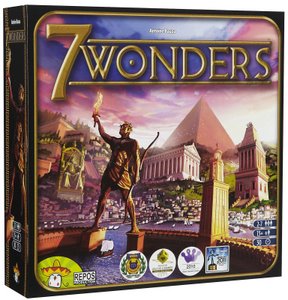
You are the leader of one of the 7 great cities of the Ancient World. Gather resources, develop commercial routes, and affirm your military supremacy. Build your city and erect an architectural wonder which will transcend future times.
7 Wonders lasts three ages. In each age, players receive seven cards from a particular deck, choose one of those cards, then pass the remainder to an adjacent player. Players reveal their cards simultaneously, paying resources if needed or collecting resources or interacting with other players in various ways. (Players have individual boards with special powers on which to organize their cards, and the boards are double-sided). Each player then chooses another card from the deck they were passed, and the process repeats until players have six cards in play from that age. After three ages, the game ends.
In essence, 7 Wonders is a card development game. Some cards have immediate effects, while others provide bonuses or upgrades later in the game. Some cards provide discounts on future purchases. Some provide military strength to overpower your neighbors and others give nothing but victory points. Each card is played immediately after being drafted, so you'll know which cards your neighbor is receiving and how his choices might affect what you've already built up. Cards are passed left-right-left over the three ages, so you need to keep an eye on the neighbors in both directions.
Agricola
1-5 Players · 30-150 Minutes · Economic / Strategy / Farming
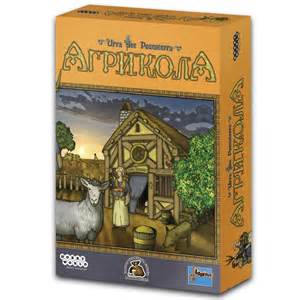
In Agricola, you're a farmer in a wooden shack with your spouse and little else. On a turn, you get to take only two actions, one for you and one for the spouse, from all the possibilities you'll find on a farm: collecting clay, wood, or stone; building fences; and so on. You might think about having kids in order to get more work accomplished, but first you need to expand your house. And what are you going to feed all the little rugrats?
There are 14 game rounds occurring in 6 stages, with a Harvest at the end of each stage (after Rounds 4, 7, 9, 11, 13, and 14). Each player starts with two playing tokens (farmer and spouse) and thus can take two turns, or actions, per round. There are multiple options, and while the game progresses, more options become available. But you won't have time to make them all happen, so plan carefully!
Resources: Rules
Arkham Horror
1-8 Players · 120-240 Minutes · Cooperative / Adventure / Horror
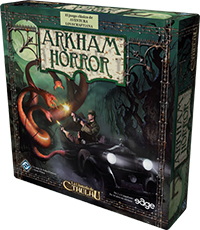
The year is 1926, and it is the height of the Roaring Twenties. Flappers dance till dawn in smoke-filled speakeasies drinking alcohol supplied by rum runners and the mob. It's a celebration to end all celebrations in the aftermath of the war to end all wars. Yet a dark shadow grows in the city of Arkham. Alien entities known as Ancient Ones lurk in the emptiness beyond space and time, writhing at the gates between worlds. These gates have begun to open and must be closed before the Ancient Ones make our world their ruined domination. Only a handful of investigators stand against the Arkham Horror. Will they Prevail?
Arkham Horror is a cooperative adventure game themed around H.P. Lovecraft's Cthulhu Mythos. Players choose from 16 Investigators and take to the streets of Arkham. Before the game, one of the eight Ancient Ones is chosen and it's up to the Investigators to prevent it from breaking into our world. During the course of the game, players will upgrade their characters by acquiring skills, allies, items, weapons, and spells. It's up to the players to clean out the streets of Arkham by fighting many different types of monsters, but their main goal is to close portals to other dimensions that are opening up around town. With too many portals open the Ancient One awakens and the players only have one last chance to save the world. Defeat the Ancient One in combat!
Resources: Rules
Backgammon
2 Players · 30 Minutes · Strategy
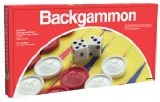
A classic abstract strategy game dating back thousands of years. Each player has a set of 15 "men" that must be moved from their starting positions, around, and then off the board. Dice are thrown each turn, and each player must decide which of his men to move based on the outcome of the roll. Players can capture each other's men, forcing the captured men to restart their journey around the board.
The winner is the first player to get all 15 men off the board. A more recent addition to the game is the "doubling cube", which allows players to up the stakes of the game, as it is often played for money. Although the game relies on dice to determine movement, there is a large degree of strategy in deciding how to make the most effective moves given each dice roll as well as measuring the risk in terms of possible rolls the opponent may get.
Battleship
2 Players · 30 Minutes · Strategy / Wargame

Battleship was originally a pencil-and-paper public domain game known by different names, but Milton Bradley made it into the well known board game in 1967. The pencil and paper grids were changed to plastic grids with holes that could hold plastic pegs used to record the guesses.
Each player deploys his ships (of lengths varying from 2 to 5 squares) secretly on a square grid. Then each player shoots at the other's grid by calling a location. The defender responds by "Hit!" or "Miss!". You try to deduce where the enemy ships are and sink them. First to do so wins.
The Salvo variant listed in the rules allows each player to call out from 1 to 5 shots at a time depending on the amount of ships the player has left (IE: players each start off with 5 ships, so they start off with 5 shots. As ships are sunk, the players gets fewer shots). This version of the game is closer to the original pencil-and-paper public domain game. Many versions of the pencil-and-paper game have different amounts of shots based on the ship (IE: Battleship: 5 shots. Destroyer: 3 Shots, Etc.).
Betrayal At House on the Hill
3-6 Players · 60 Minutes · Cooperative / Horror / Adventure
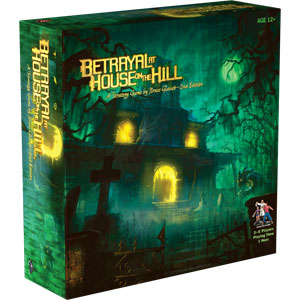
Betrayal at House on the Hill quickly builds suspense and excitement as players explore a haunted mansion of their own design, encountering spirits and frightening omens that foretell their fate. With an estimated one hour playing time, Betrayal at House on the Hill is ideal for parties, family gatherings or casual fun with friends.
Betrayal at House on the Hill is a tile game that allows players to build their own haunted house room by room, tile by tile, creating a new thrilling game board every time. The game is designed for three to six people, each of whom plays one of six possible characters.
Secretly, one of the characters betrays the rest of the party, and the innocent members of the party must defeat the traitor in their midst before it’s too late! Betrayal at House on the Hill will appeal to any game player who enjoys a fun, suspenseful, and strategic game.
Resources: Rules
Between Two Cities
1-7 Players · 20 Minutes · Family / Drafting / Strategy
Between Two Cities: Capitals
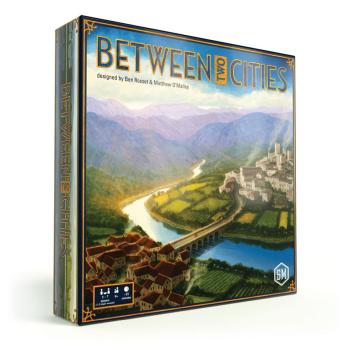
It is the early 1800s, a time of immense construction and urbanization. You are a world-renowned master city planner who has been asked to redesign two different cities. Projects of such significance require the expertise of more than one person, so for each assignment you are paired with a partner with whom to discuss and execute your grandiose plans. Will your planning and collaborative skills be enough to design the most impressive city in the world?
Between Two Cities is a partnership-driven tile-drafting game in which each tile represents part of a city: factory, shop, park, landmarks, etc. You work with the player on your left to design the heart of one city, and with the player on your right to design the heart of another city. On each turn you select two tiles from hand, reveal them, then work with your partners separately to place one of those tiles into each of your two cities before passing the remaining hand of tiles around the table.
At the end of the game, each city is scored for its livability. Your final score is the lower of the livability scores of the two cities you helped design. To win, you have to share your attention and your devotion between two cities. The player with the highest final score wins the game.
The game features play for 3-7 players in 20-25 minutes, a 2-player variant for head-to-head competition as well as a solo variant (Automa).
Resources: Rules
Between Two Cities: Capitals
1-7 Players · 30-35 Minutes · Family / Drafting / Strategy
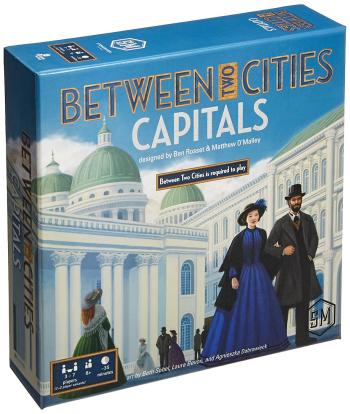
Now at the pinnacle of your career, you are sought after by two capital cities to build their city centers. Not only do you have to consider the natural features that were the reason for their founding, you also need to ensure the civic buildings are appropriately placed, and you must not forget to satisfy the citizens' demands along the way.
Between Two Cities: Capitals expands the base game by adding several new challenges: landscapes, districts, and civic building tiles. This is not a standalone expansion; you need the original Between Two Cities game to play. In more detail:
· Landscape mats give each city a unique layout to build on and around.
· Districts give players a majority bonus for connecting specific types of tiles.
· Civic building tiles are a new type of building tile; each unique civic building wants to be adjacent to two specific tile types (and not one specific tile type).
Resources: Rules
Brewopoly
2-6 Players · 120 Minutes · Economic / Negotiation
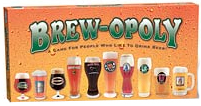
Here's a game for people who like to drink beer! Are you a pilsner person, a lager lover, a brown ale girl, a stout fellow, or is wheat your treat? Whatever your pleasure, from Alpha King Pale Ale to Zonker Stout, our nation's award winning microbreweries produce the suds that will tickle your taste buds. In Brew-Opoly, buy or trade your favorite beers and increase property value by purchasing Brewpubs and Microbreweries for your monopolies. Sounds easy enough until you have to put on your beer goggles and kiss your neighbor or stand and sing "99 Bottles of Beer on the Wall!" So choose your token and advance to Cheers! Who knows! You might be collecting money from every player for a beer run...or you may be chosen 'Beer Drinker of the Month!'
This game follows the same rulebook as the original Parker Brothers hit, Monopoly; it just uses different elements, graphics and themes. If you're going to play Monopoly, and you like beer, you might as well play this instead.
Carcassonne
2-5 Players · 30-45 Minutes · Medieval / Territory / Family
The River
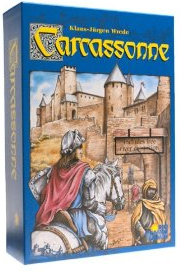
Carcassonne is a tile-placement game in which the players draw and place a tile with a piece of southern French landscape on it. The tile might feature a city, a road, a cloister, grassland or some combination thereof, and it must be placed adjacent to tiles that have already been played, in such a way that cities are connected to cities, roads to roads, etcetera. Having placed a tile, the player can then decide to place one of his meeples on one of the areas on it: on the city as a knight, on the road as a robber, on a cloister as a monk, or on the grass as a farmer. When that area is complete, that meeple scores points for its owner.
During a game of Carcassonne, players are faced with decisions like: "Is it really worth putting my last meeple there?" or "Should I use this tile to expand my city, or should I place it near my opponent instead, giving him a hard time to complete his project and score points?" Since players place only one tile and have the option to place one meeple on it, turns proceed quickly even if it is a game full of options and possibilities.
Resources: Rules
Cargo Noir
2-5 Players · 30-90 Minutes · Family / Economic
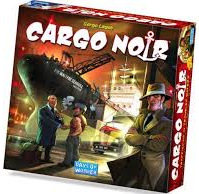
In Serge Laget's Cargo Noir - his fourth standalone box game from Days of Wonder - players represent "families" that traffic in smuggled goods in a 1950s noir setting. Each turn, you'll set sail to various ports where cargo is known to get "lost" for the right price - Hong Kong, Bombay, Rotterdam, New York and more - and you'll make an offer for the goods on display. If another family then offers more in that port, you'll need to up your bid or take your money and slink away to look for goods elsewhere. Stand alone in a port, though, and you'll be able to discretely move the goods from the dock to your personal warehouse. Says Laget in a press release accompanying the game announcement, "Everything in Cargo Noir grew from a core auction mechanism that is simple and trivial to explain - you can only bid up, and the last bidder standing gets the goods."
Once you collect goods, you can trade them in to add more ships to your fleet - allowing you to scout for wares in more locations - purchase Victory Spoils, or take other actions. The more goods you collect, the more valuable they can be. The player with the most Spoils at game end wins.
Resources: Rules
Castellan
2-4 Players · 45 Minutes · Strategy
Blue/Red
Green/Yellow
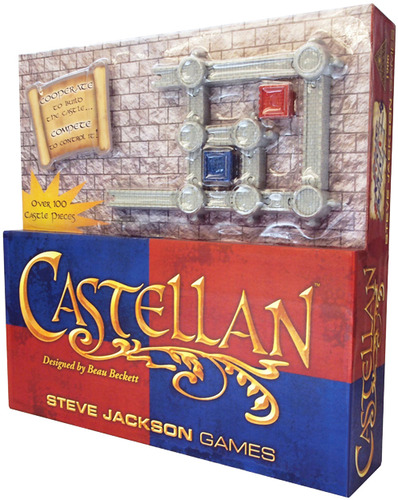
In Castellan, two players work together to build a castle. Finely-detailed wall and tower pieces link together to form courtyards, and the player who finishes a courtyard claims it with a Keep, scoring points for that courtyard equal to the number of tower pieces surrounding it.
In more detail, each player starts the game with two decks of cards: a wall deck and a tower deck. Each card allows a player to play the components shown on it, with the wall deck cards always depicting at least one wall (and some combination of walls/towers) and the tower deck cards always depicting at least one tower (and again some combination of walls/towers). On a turn, a player can play as many cards as she wants, but she draws only one card at the end of her turn. The goal is to create courtyards - and subdivide existing courtyards - while keeping your opponent from doing the same. Players have the same cards in their decks, so the challenge is all about what to use when. The game ends when all the castle pieces are used up, and the player with the most points wins.
Resources: Rules
Catan
3-4 Players · 60-120 Minutes · Strategy / Civilization / Negotiation
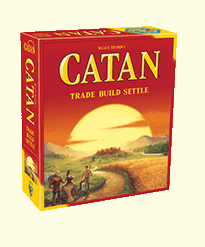
In Catan, players try to be the dominant force on the island of Catan by building settlements, cities and roads. On each turn dice are rolled to determine what resources the island produces. Players collect these resources - wood, grain, brick, sheep, or stone - to build up their civilizations to get to 10 victory points and win the game.
A turn consists of possibly playing a development card, rolling the dice, everyone (perhaps) collecting resource cards based on the roll and position of houses (or upgraded cities - think: hotels) unless a 7 is rolled, turning in resource cards (if possible and desired) for improvements, trading cards at a port, and trading resource cards with other players. If a 7 is rolled, the active player moves the robber to a new hex tile and steals resource cards from other players who have built structures adjacent to that tile.
Points are accumulated by building settlements and cities, having the longest road and the largest army (from some of the development cards), and gathering certain development cards that simply award victory points. When a player has gathered 10 points (some of which may be held in secret), he announces his total and claims the win.
Resources: Rules
Checkers
2 Players · 30 Minutes · Strategy
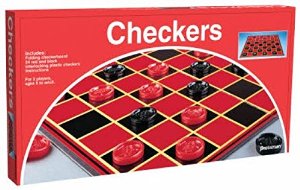
Abstract strategy game where players move disc-shaped pieces across an 8 by 8 cross-hatched ("checker") board.
Pieces only move diagonally, and only one space at a time. If a player can move one of his pieces so that it jumps over an adjacent piece of their opponent and into an empty space, that player captures the opponent's disc. Jumping moves must be taken when possible, thereby creating a strategy game where players offer up jumps in exchange for setting up the board so that they jump even more pieces on their turn. A player wins by removing all of his opponent's pieces from the board or by blocking the opponent so that he has no more moves.
Chess
2 Players · 60 Minutes · Strategy

Chess is a two-player, abstract strategy board game that represents medieval warfare on an 8x8 board with alternating light and dark squares. Opposing pieces, traditionally designated White and Black, are initially lined up on either side. Each type of piece has a unique form of movement and capturing occurs when a piece, via its movement, occupies the square of an opposing piece. Players take turns moving one of their pieces in an attempt to capture, attack, defend, or develop their positions. Chess games can end in checkmate, resignation, or one of several types of draws. Chess is one of the most popular games in the world, played by millions of people worldwide at home, in clubs, online, by correspondence, and in tournaments. Between two highly skilled players, chess can be a beautiful thing to watch, and a game can provide great entertainment even for novices. There is also a large literature of books and periodicals about chess, typically featuring games and commentary by chess masters.
Civilization: A New Dawn
2-4 Players · 60-120 Minutes · 4X / Strategy / Civilization
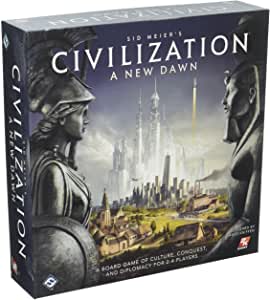
Sid Meier's Civilization: A New Dawn is a strategy board game in which two to four players act as the rulers of history's most memorable empires. Over the course of the game, players will expand their domains, gain new technologies, and build many of humanity's greatest wonders. In the end, one nation will rise above all others to leave its indelible mark upon history.
This new game presents players with an undiscovered country to conquer, built from beautifully illustrated map tiles. These would-be conquerors construct and populate the map with barbarians, natural resources, and city-states, then formulate their plans for how they will shape this world to their vision. Their exact goals, however, change with each game. Agendas are detailed on victory cards, three of which are drawn during set up. Players race to become the first to accomplish one agenda on each of these victory cards, spreading throughout the world and ensuring their civilization’s place as the greatest world power.
Resources: Rules
Codenames
2-8 Players · 15 Minutes · Party / Deduction
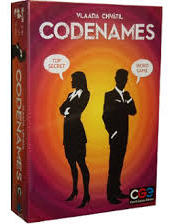
Two rival spymasters know the secret identities of 25 agents. Their teammates know the agents only by their CODENAMES.
In Codenames, two teams compete to see who can make contact with all of their agents first. Spymasters give one-word clues that can point to multiple words on the board. Their teammates try to guess words of the right color while avoiding those that belong to the opposing team. And everyone wants to avoid the assassin.
Codenames: Win or lose, it's fun to figure out the clues.
Resources: Rules
Codenames: Duet
2-8 Players · 15 Minutes · Party / Deduction
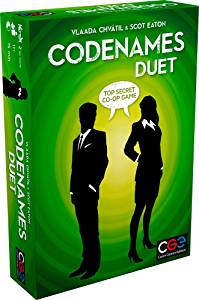
Two rival spymasters know the secret identities of 25 agents. Their teammates know the agents only by their CODENAMES.
Codenames Duet keeps the basic elements of Codenames — give one-word clues to try to get someone to identify your agents among those on the table — but now you're working together as a team to find all of your agents. (Why you don't already know who your agents are is a question that Congressional investigators will get on your back about later!)
To set up play, lay out 25 word cards in a 5×5 grid. Place a key card in the holder so that each player sees one side of the card. Each player sees a 5×5 grid on the card, with nine of the squares colored green (representing your agents) and three squares colored black (representing assassins). Three of the nine squares on each side are also green on the other side, one assassin is black on both sides, one is green on the other side and the other is an innocent bystander on the other side.
Collectively, you need to reveal all fifteen agents — without revealing an assassin — before time runs out in order to win the game. Either player can decide to give the first one-word clue to the other player, along with a number. Whoever receives the clue places a finger on a card to identify that agent. If correct, they can attempt to identify another one. If they identify a bystander, then their guessing time ends. If they identify an assassin, you both lose! Unlike regular Codenames, they can keep guessing as long as they keep identifying an agent each time; this is useful for going back to previous clues and finding ones they missed earlier. After the first clue is given, players alternate giving clues.
Resources: Rules
Codenames: Pictures
2-8 Players · 15 Minutes · Party / Deduction
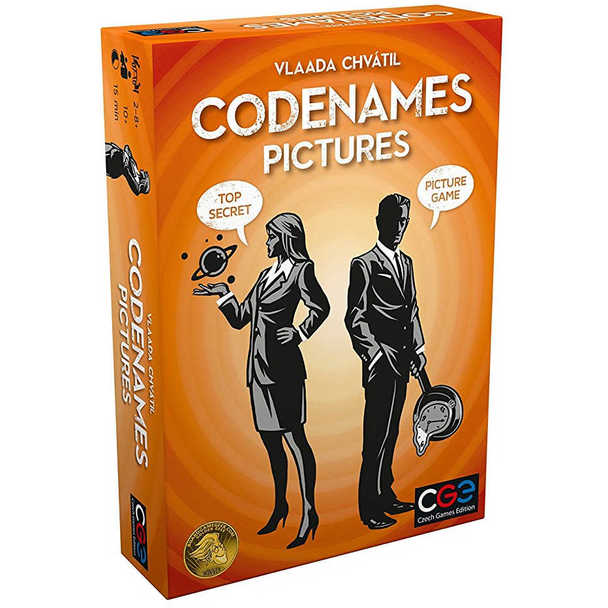
Two rival spymasters know the secret identities of 25 agents. Their teammates know the agents only by their CODENAMES.
What are these strange symbols on the map? They are code for locations where spies must contact secret agents!
Two rival spymasters know the agent in each location. They deliver coded messages telling their field operatives where to go for clandestine meetings. Operatives must be clever. A decoding mistake could lead to an unpleasant encounter with an enemy agent – or worse, with the assassin! Both teams race to contact all their agents, but only one team can win.
Codenames: Pictures differs from the original Codenames in that the agents are no longer represented by a single word, but by an image that contains multiple elements.
Resources: Rules
Control
2-4 Players · 5-15 Minutes · Card / Hand Management

In Control, players are time travelers who have been caught in a rupture in spacetime and displaced outside time. You must use Fuel Cells (the cards) to refuel your time machine or stop other players from refueling theirs first.
To escape the rupture, you must reach a Fuel Cell Charge of 21 or more on your Installed Fuel Cells at the end of your turn. Whoever does so first closes the rupture, leaving the other travelers lost outside time.
During your turn, you choose to either draw a card, install a Fuel Cell in your area of play, burn a Fuel Cell to the discard pile, or defuse an opponent's Fuel Cell. The Fuel Cell Charge on cards ranges from 1-10 and different abilities on Fuel cells make for changing strategies and multiple lines of play.
Resources: Rules
Cow Tiger Santa Claus
2-12 Players · 30-360 Minutes · Card / Family / Travel
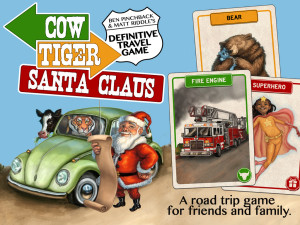
The definitive travel game. At the start of a trip, the group will draw a card from each of three categories (easy, medium, hard) and they will keep their eyes peeled for School Buses, Bears, Superheroes, and more. The first player to spot and claim one of each is the winner.
Cranium
4-16 Players · 60 Minutes · Party / Trivia / Word

Cranium bills itself as the "whole-brain" game. It's a party game that borrows from a host of other popular party games of recent times. Players have to successfully complete activities in each of four sections to win: In Creative Cat, a player must clue a word to his or her teammates by drawing it, sculpting it in clay, or drawing it with his or her eyes closed. In Data Head, one must answer a variety of trivia questions. In Word Worm, players unscramble words, spell challenging words, guess definitions, identify words with letters left out, or spell words backwards. And in Star Performer, players must whistle a song, impersonate a celebrity, or act out a clue.
Dead of Winter
2-5 Players · 60 Minutes · Cooperative / Horror
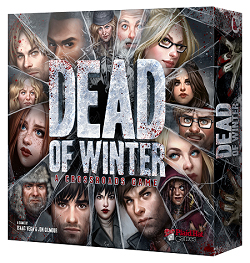
Dead of Winter: A Crossroads Game, the first game in this series, puts 2-5 players in a small, weakened colony of survivors in a world where most of humanity is either dead or diseased, flesh-craving monsters. Each player leads a faction of survivors with dozens of different characters in the game.
Though it is a cooperative mechanic, each player must also complete his personal secret objective. Certain games could end with all players winning, some winning and some losing, or all players losing. Work toward the group's goal, but don't get walked all over by a loudmouth who's looking out only for his own interests!
Dead of Winter has players making frequent, difficult, heavily-thematic, wildly-varying decisions that often have them deciding between what is best for the colony and what is best for themselves.
Resources: Rules
Deal or No Deal
2-6 Players · 30 Minutes · TV / Chance
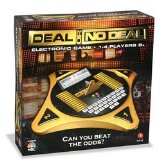
Can you beat the odds? In this interactive board game, contestants are encouraged to get the advice of their family and friends, but they have to make the final decision on the potential "deal"... Based upon the international phenomenon of the highly successful Deal or No Deal television show, this game follows the same set of rules. Select a briefcase and either stay with that briefcase or make a deal with the bank for a cash offer in exchange for your briefcase's hidden cash value. Will you end up with $1 million, or $.01?
Dominoes
2-10 Players · 30 Minutes · Strategy
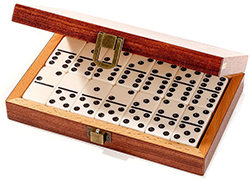
While most modern domino pieces are rectangular and made of ceramic or heavy plastic, they were historically carved from ivory or animal bone with small, round pips of inset ebony. The game's name comes from the pieces' resemblance to Venetian Carnival masks known as domini, which were white with black spots. These masks were so named, in turn, because they resembled French priests' winter hoods, being black on the outside and white on the inside. The name ultimately derives from the Latin dominus, meaning "lord" or "master."
The oldest domino sets have been dated from around 1120. Modern dominoes, as most of the Western world knows them, however, appear to be a Chinese invention. They were apparently derived from cubic dice, which had been introduced into China from India some time in the distant past. Each domino originally represented one of the 21 results of throwing two dice. One half of each domino is set with the pips from one die and the other half contains the pips from the second die. Chinese sets also introduce duplicates of some throws and divide the dominoes into two classes: military and civil. Chinese dominoes are also longer than typical European dominoes. Over time Chinese dominoes also evolved into the tile set used to play Mah Jong, a game which swept across the United States in the early to mid 1920s.
Eclipse: New Dawn for the Galaxy
2-6 Players · 180 Minutes · Strategy / Territory / 4X
Rise of the Ancients

The galaxy has been a peaceful place for many years. After the ruthless Terran-Hegemony War (30.027-33.364), much effort has been employed by all major spacefaring species to prevent the terrifying events from repeating themselves. The Galactic Council was formed to enforce precious peace, and it has taken many courageous efforts to prevent the escalation of malicious acts. Nevertheless, tension and discord are growing among the seven major species and in the Council itself. Old alliances are shattering, and hasty diplomatic treaties are made in secrecy. A confrontation of the superpowers seems inevitable - only the outcome of the galactic conflict remains to be seen. Which faction will emerge victorious and lead the galaxy under its rule?
A game of Eclipse places you in control of a vast interstellar civilization, competing for success with its rivals. You will explore new star systems, research technologies, and build spaceships to wage war with. There are many potential paths to victory, so you need to plan your strategy according to the strengths and weaknesses of your species, while paying attention to the other civilizations' endeavors.
The shadows of the great civilizations are about to eclipse the galaxy. Lead your people to victory!
Resources: Rule Book
Eclipse: Rise of the Ancients
2-9 Players · 180-240 Minutes · Strategy / Territory / 4X
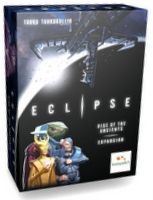
While the galactic conflict escalates and several new factions are trying to get a foothold on the galaxy, the adversaries suddenly need to find allies among themselves to face the rising threat. The systems previously thought to be empty are suddenly swarming with Ancients - whole worlds of them, with ship capabilities way beyond anything seen before. They are not willing to negotiate.
Eclipse: Rise of the Ancients, the first full-size expansion for Eclipse, introduces several new additions to the base game, such as Rare Technologies, Developments, Alliances, Ancient Homeworlds and Warp Portals. There are also three new player boards with four new different alien species to choose from. New components allow up to nine players in one session.
Due to the modular design, you can use all of these additions or just some of them in any game of Eclipse, according to your preferences and play style. The Ancients are rising. Will your civilization rise to the occasion and emerge victorious?
Resources: ROTA Rule Book
Euphoria
2-6 Players · 60 Minutes · Sci-Fi / Set Collection / Worker Placement
Leaders of Euphoria

Euphoria is a worker-placement game in which dice are your workers. The number on each die represents a worker's knowledge - that is, his level of awareness that he's in a dystopia. Worker knowledge enables various bonuses and impacts player interaction. If the collective knowledge of all of your available workers gets too high, one of them might desert you. You also have two elite recruit cards at your disposal; one has pledged allegiance to you, but the other needs some convincing. You can reveal and use the reticent recruit by reaching certain milestones in the game... or by letting other players unwittingly reach those milestones for you.
Your path to victory is paved with the sweat of your workers, the strength of your allegiances, and the tunnels you dig to infiltrate other areas of the world, but the destination is a land grab in the form of area control. You accomplish this by constructing markets that impose harsh restrictions of personal freedoms upon other players, changing the face of the game and opening new paths to victory. You can also focus on gathering artifacts from the old world, objects of leisure that are extremely rare in this utilitarian society. The dystopian elite covet these artifacts - especially matching pairs - and are willing to give you tracts of land in exchange for them.
Four distinct societies, each of them waiting for you to rewrite history. What are you willing to sacrifice to build a better dystopia?
Resources: Rules
Leaders of Euphoria
2-6 Players · 60 Minutes · Sci-Fi / Set Collection / Worker Placement
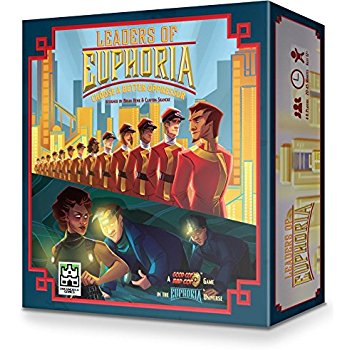
As the city of Euphoria was being established, the struggle for political dominance raged on between the Euphorians and Subterrans. The Icarites had not yet descended upon the city and the Wastelanders were still deciding whether they wanted any part of it.
Since it has become clear that the two factions cannot share control, it is time for you to pick a side. Choose your faction, find your allies, banish those who oppose you, and ensure your place at the top of the dystopian society to follow. Now it's your change to Choose a Better Oppressor!
Leaders of Euphoria: Choose a Better Oppressor is a social deduction game in the style of Good Cop Bad Cop, but set in the world of Euphoria. It takes place earlier in the timeline than Euphoria, when the city was young and foolish. Players will have 3 cards in front of them that determine whether they are on the Euphorian or Subterran team that will be investigated throughout the game to figure out who's on their team and who's not.
Resources: Rules
Evolution
2-6 Players · 50-70 Minutes · Card / Family

In Evolution, players adapt their species in a dynamic ecosystem where food is scarce and predators lurk. Traits like Hard Shell and Horns will protect your species from Carnivores, while a Long Neck will help them get food that others cannot reach. With over 4,000 ways to evolve your species, every game becomes a different adventure.
Evolution packs a surprising amount of variety for a game with simple rules. The variety comes from the synergies between the trait cards and from the different personalities at the table. Some players thrive on creating Carnivores to wreak havoc on their fellow players. Others prefer to stay protected and mind their own business. Evolution encourages both play styles by giving each of them multiple paths to victory. And it is the mix of play styles at the table that ultimately determines the eco-system in which the player are adapting. So gather your friends and see who can best adapt to the changing world around them.
Farkle
2-8 Players · 30 Minutes · Dice
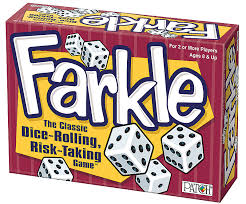
A push-your-luck game of rolling dice for points. You roll 6 dice, remove only the dice you want to use for points, then re-roll the remaining dice. Points can be scored by specific numbers (e.g. 5 or 1) or sets of the same number. If you can use all six dice for points, pick them all up and keep going.
'Bank' your points and end your turn at any time but beware, some scoring dice must be removed after every roll - if no scoring dice at all are rolled your turn ends and you score zero points.
The game ends when the winning player reaches a set total of points, usually 10,000.
First Martians
1-4 Players · 60-90 Minutes · Cooperative / Exploration / Adventure
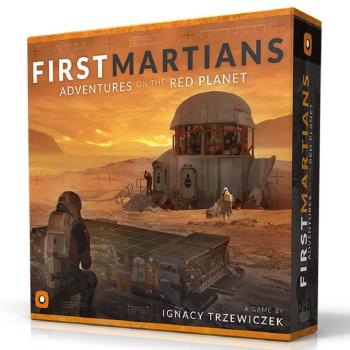
Adventures on the Red Planet
Built on the core of the award-winning Robinson Crusoe: Adventures on the Cursed Island, First Martians: Adventures on the Red Planet pits players against the hostile Martian environment and a whole host of new adventures and challenges. The immersion experience is further enhanced with an integrated app that maintains the balance and challenge throughout. Players have the option of taking on the design as a series of separate games, in a custom campaign mode in which each successive game builds on the last.
Resources: Rules
Flock
2-5 Players · 30 Minutes · Strategy / Worker Placement

Lead the most impressive flock through feeding, nest building, and hatching. Selecting the actions is simple, but when one bird flies, so do all the others! Can you time your actions to take advantage of when the flocks fly?
During the game Flock, players try to expand their flock with the goal of scoring the most victory points after three rounds of play. Victory points are scored by controlling the action cards at the end of each round. Also, be sure to have enough tasty worms to feed your birds at the end of each round, or otherwise they will fly away. Will your flock be on top of the pecking order?
Forbidden Desert
2-5 Players · 45 Minutes · Cooperative / Adventure
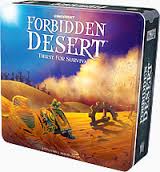
Gear up for a thrilling adventure to recover a legendary flying machine buried deep in the ruins of an ancient desert city. You'll need to coordinate with your teammates and use every available resource if you hope to survive the scorching heat and relentless sandstorm. Find the flying machine and escape before you all become permanent artifacts of the forbidden desert!
In Forbidden Desert, a thematic sequel to Forbidden Island, players take on the roles of brave adventurers who must throw caution to the wind and survive both blistering heat and blustering sand in order to recover a legendary flying machine buried under an ancient desert city. While featuring cooperative gameplay similar to Forbidden Island, Forbidden Desert is a fresh new game based around an innovative set of mechanisms, such as an ever-shifting board, individual resource management, and a unique method for locating the flying machine parts.
Resources: Rules
Galaxy Trucker
2-4 Players · 60 Minutes · Sci-Fi / Economic
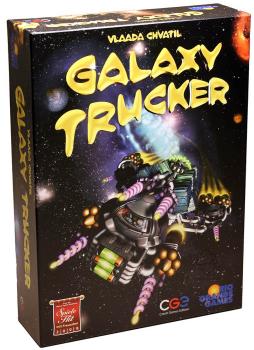
In a galaxy far, far away... they need sewer systems, too. Corporation Incorporated builds them. Everyone knows their drivers - the brave men and women who fear no danger and would, if the pay was good enough, even fly through Hell.
Now you can join them. You will gain access to prefabricated spaceship components cleverly made from sewer pipes. Can you build a space ship durable enough to weather storms of meteors? Armed enough to defend against pirates? Big enough to carry a large crew and valuable cargo? Fast enough to get there first?
Of course you can. Become a Galaxy Trucker. It's loads of fun.
Resources: Rules
Ghost Stories
1-4 Players · 60 Minutes · Fantasy / Horror / Cooperative
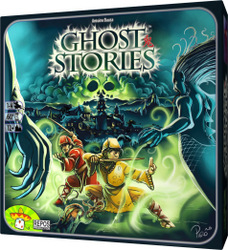
Ghost Stories is a cooperative game in which the players protect the village from incarnations of the lord of hell - Wu-Feng - and his legions of ghosts before they haunt a town and recover the ashes that will allow him to return to life. Each Player represents a Taoist monk working together with the others to fight off waves of ghosts.
The players, using teamwork, will have to exorcise the ghosts which will appear during the course of the game. Using special powers and requesting help from the villagers, the players have a constant battle on their hands until all the ghosts have been exorcised. But it is not that easy! The ghosts themselves also have special powers, and are able to haunt and torment the village. Things can very quickly get out of control and turn what was a winning strategy for the players into a chaotic mess of a fight that threatens to quickly overrun them all. Luck and strategy both play equal parts in this game, and each can change direction in an instant. Good luck!
Resources: Rules · Help Sheet
Alien Frontiers
2-4 Players · 60-120 Minutes · Worker Placement / Strategy / Space
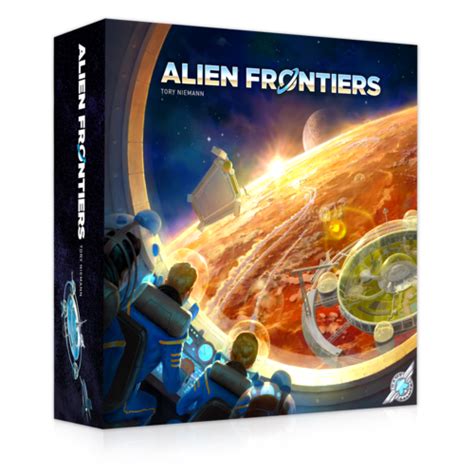
lien Frontiers is a game of resource management and planetary development for two to four players. During the game you will utilize orbital facilities and alien technology to build colony domes in strategic locations to control the newly discovered world.
The game board shows the planet, its moon, the stations in orbit around the planet, and the solar system’s star. The dice you are given at the start of the game represent the space ships in your fleet. You will assign these ships to the orbital facilities in order to earn resources, expand your fleet, and colonize the planet.
As the game progresses, you will place your colony tokens on the planet to represent the amount of control you have over each territory. Those territories exert influence over specific orbital facilities and, if you control a territory, you are able to utilize that sway to your advantage.
Roll and place your dice to gain advantages over your opponent and block them out of useful areas of the board. Use Alien Tech cards to manipulate your dice rolls and territory bonuses to break the rules. Steal resources, overtake territories, and do whatever it takes to get your colonies on the map first! Don't dream it'll be easy, though, because the other players will be trying to do the same thing.
Jenga
2-8 Players · 20 Minutes · Party / Action / Dexterity

A tower building game, Jenga is played with 54 wooden blocks. The blocks are stacked in a tower formation; each story is three blocks placed adjacent to each other along their long side, and each story is placed perpendicular to the previous. There are therefore 18 stories to the Jenga tower.
Once the tower is built, the person who built the tower moves first. Moving in Jenga consists of taking one and only one block from any story except the completed top story of the tower at the time of the turn, and placing it on the topmost story in order to complete it. Only one hand at a time may be used to remove a block. Blocks may be bumped to find a loose block that will not disturb the rest of the tower. Any block that is moved out of place may be left out of place if it is determined that it will knock the tower over when removed. The turn ends when the next person to move touches the tower, although he or she can wait 10 seconds before moving for the previous turn to end if they believe the tower will fall in that time.
The game ends when the tower falls in any significant way - in other words, any piece falls from the tower, other than the piece being knocked out to move to the top. The loser is the person who made the tower fall; the winner is the person who moved before the loser.
Letters From Whitechapel
2-6 Players · 120 Minutes · Strategy / Mystery
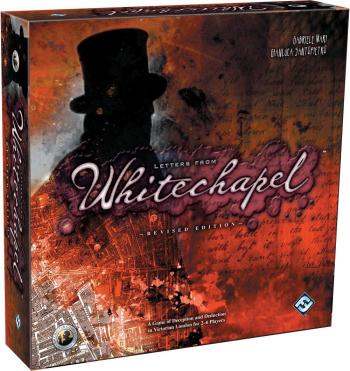
Get ready to enter the poor and dreary Whitechapel district in London 1888 - the scene of the mysterious Jack the Ripper murders - with its crowded and smelly alleys, hawkers, shouting merchants, dirty children covered in rags who run through the crowd and beg for money, and prostitutes - called "the wretched" - on every street corner.
The board game Letters from Whitechapel, which plays in 90-150 minutes, takes the players right there. One player plays Jack the Ripper, and his goal is to take five victims before being caught. The other players are police detectives who must cooperate to catch Jack the Ripper before the end of the game. The game board represents the Whitechapel area at the time of Jack the Ripper and is marked with 199 numbered circles linked together by dotted lines. During play, Jack the Ripper, the Policemen, and the Wretched are moved along the dotted lines that represent Whitechapel's streets. Jack the Ripper moves stealthily between numbered circles, while policemen move on their patrols between crossings, and the Wretched wander alone between the numbered circles.
Resources: Rules
Liar's Dice
2-6 Players · 15 Minutes · Deception / Dice
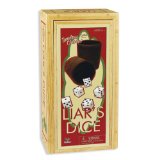
Liar's Dice is a dice game where each player is given five dice and cup to roll and hide them with. Players make successively higher declarations regarding the results of all the dice remaining in the game, e.g. "there are ten sixes". However, someone can always contest the bid. When that happens, all the dice are revealed and either the bidder or the caller loses dice, depending on who was correct. The last player with dice is the winner.
There is also a public domain dice game known as Liar's Dice. This game is often played with Poker Dice, and differs from the marketed versions in that players only declare on their own hand's value (as opposed to all dice being in play), using poker-hand values.
Lunarchitects
1-5 Players · 45-60 Minutes · Tile Placement / Family
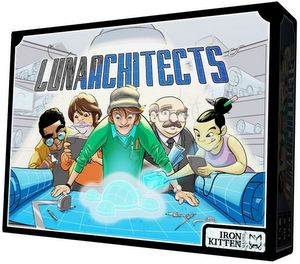
You and your fellow players are architects at Luna Mare, the architectural firm planning the first base on the moon. You will compete with your coworkers for access to building blueprints, astronauts, and construction resources- all to develop the most successful moonbase!
Lunarchitects is a medium-weight strategy game that has players moving their pawns forward in a refilling circular queue to claim building blueprints. Players use the claimed blueprints to build personal moonbase plans in front of them. But instead of turns proceeding clockwise, the player furthest behind in the queue always takes the next turn. This makes blueprint choices a matter of quality over quantity.
Blueprints from four stages are shuffled then stacked, with stages increasing in both cost and power. Each time all players complete a lap of the blueprint queue, scoring occurs- and the game ends after the fourth round of scoring. The player who has collected the most points is the winner, and their plans will guide the creation the first settlement on the moon!
Unknown tile arrangement and variable scoring schemes (determined before the start) makes the game very replayable, as there is never a single most-powerful strategy.
Monopoly
2-8 Players · 180 Minutes · Economic / Negotiation

Players take the part of land owners, attempting to buy and then develop their land. Income is gained by other players visiting their properties and money is spent when they visit properties belonging to other players. When times get tough, players may have to mortgage their properties to raise cash for fines, taxes and other misfortunes.
On his turn, a player rolls two dice and moves that number of spaces around the board. If the player lands on an as-yet-unowned property, he has the opportunity to buy it and add it to his portfolio or allow the bank to auction it to the highest bidder. If a player owns all the spaces within a color group, he may then build houses and hotels on these spaces, generating even more income from opponents who land there. If he lands on a property owned by another player, he must pay that player rent according to the value of the land and any buildings on it. There are other places on the board which can not be bought, but instead require the player to draw a card and perform the action on the card, pay taxes, collect income, or even go to jail.
Munchkin Quest
2-4 Players · 180 Minutes · Adventure / Exploration / Fantasy
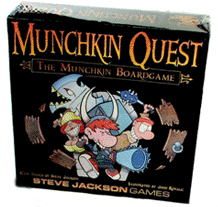
Kill the monster, grab the treasure, stab your buddy. That's what it's all about. Now, Munchkin comes to the boardgame.
Cooperate with the whole group, adventure with a partner, or strike out on your own. You don't know what's behind a door until you open it . . . then another tile is added to the dungeon. Battle monsters for power and treasure, or send them after your friends. Reach Level 10, and then get out alive if you can!
Resources: Rules · Player Mat (11x17)
Pandemic
2-4 Players · 60 Minutes · Strategy / Cooperative

In Pandemic, several virulent diseases have broken out simultaneously all over the world! The players are disease-fighting specialists whose mission is to treat disease hotspots while researching cures for each of four plagues before they get out of hand.
The game board depicts several major population centers on Earth. On each turn, a player can use up to four actions to travel between cities, treat infected populaces, discover a cure, or build a research station. A deck of cards provides the players with these abilities, but sprinkled throughout this deck are Epidemic! cards that accelerate and intensify the diseases' activity. A second, separate deck of cards controls the "normal" spread of the infections.
Taking a unique role within the team, players must plan their strategy to mesh with their specialists' strengths in order to conquer the diseases. For example, the Operations Expert can build research stations which are needed to find cures for the diseases and which allow for greater mobility between cities; the Scientist needs only four cards of a particular disease to cure it instead of the normal five - but the diseases are spreading quickly and time is running out. If one or more diseases spreads beyond recovery or if too much time elapses, the players all lose. If they cure the four diseases, they all win!
Resources: Rules
Pass the Popcorn
2-8 Players · 30 Minutes · Movies / Trivia / Party
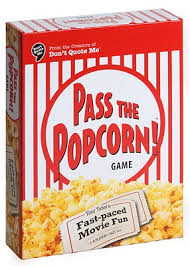
Players cover game tiles by identifying movies from clues given on Cast, Characters, Story, or Quote cards. Be the first to cover 4 tiles and win! Game covers 250 major movies, 70 top actors, and includes 32 game tiles.
Also includes a bonus Star Connection Card Game for added fun.
Pictionary
3-16 Players · 90 Minutes · Party
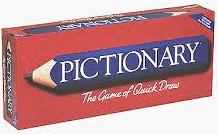
Playing Pictionary may remind you of Charades, but with drawing on paper instead of acting out the answers. In Pictionary, though, both teams' (or even all three teams') clue givers may be drawing at the same time as players strive to be the first to guess the correct answer. When the answer is not designated "All Play," one team simply tries to come up with the answer before the timer runs out, which is usually but not always possible thanks to the varying difficulty levels of the answers. No great drawing talent is required; instead, players gain an edge if they have a good imagination when guessing, empathy for their team mates, and/or a general ability to communicate in restricted circumstances. A board is provided, just to keep score on, which focuses the competition. Pictionary was a big hit when it first appeared and has been a classic on the party game scene ever since.
Pod-X
3-4 Players · 15-30 Minutes · Card / Sci-Fi
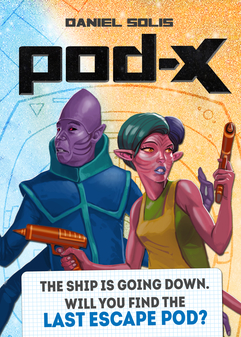
The starship is going down. You (and everyone else!) need to find the last working escape pod before it's too late. You know the ship like the back of your hand, but you also know that most of the pods are either gone or broken. You have to act now or you'll be going down with the ship.
In Pod-X, you try to deduce the secret win condition card, while also trying to meet it. You will do this by playing your cards publicly (to the table) or keeping them private (in your hand). The dealer role passes to a new player each round. Only the dealer knows the secret, so players can also examine her actions for clues. Use your best deduction and wile to maximize your score!
Pretense
2-12 Players · Metagame / Player Elimination / Role Playing
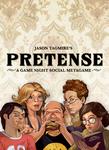
It's a game that you play throughout the course of the ENTIRE game night. You pass out role cards when everyone arrives, and then you tally the score when everyone leaves. As a player you have one job, fulfill your duty as stated on your card. Maybe you are the Glutton. All you need to do is make sure someone hands you food or drink. It's easy enough to say "can you pass me those chips?", but at the same time is it too obvious to say that? Other players can call you out, which will eliminate you from the game, so you better be slick about it. It's all about setting up your agenda in an unsuspicious way. That's Pretense for you.
So you get a role card with a set goal in mind. Once you fulfill your goal the one who inadvertently helped you loses their card to you and you score your card and you get to keep playing. At the end of the night or when the shindig is over, tally up the points and see who wins.
Quelf
3-8 Players · 60 Minutes · Party / Trivia / Action
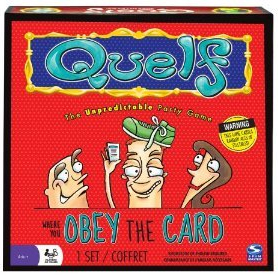
Whether you're answering hilarious trivia, performing ridiculous stunts, or obeying silly rules, Quelf will inspire you to use your creativity, wit and sense of humor in ways you've never imagined.
As you move around the game board, as one of eight quirky characters, crazy things start to happen. Your friends start talking strangely. Your mom's face is wrapped in toilet paper. Your dad is acting like Dracula. And you are reciting a poem about your armpits.
Cards: Stuntz - balancing acts, costume creations, daredevil moves, weird contraptions. Showbiz - mime, sing, tapdance, draw, do impressions, write poetry. Quizzle - mind-twisting trivia, nutty riddles, brain teasers. Rulez - rules you must follow: snort like a pig when you laugh, say everything twice, roll the dice with your elbows. Scatterbrainz - choose one of two topics and everyone gives answers until no one can think of a valid one ("Ways to get your leg out of a spring-loaded, steel bear trap" or "Brands of Lipstick")
Risk
2-6 Players · 120 Minutes · Strategy / Territory / 4X

Possibly the most popular, mass market war game. The goal is conquest of the world.
Each player's turn consists of: gaining reinforcements through number of territories held, control of every territory on each continent, and turning sets of bonus cards; Attacking other players using a simple combat rule of comparing the highest dice rolled for each side. Players may attack as often as desired. If one enemy territory is successfully taken, the player is awarded with a bonus card; Moving a group of armies to another adjacent territory.
Resources: Rules
Rummikub
2-4 Players · 60 Minutes · Card / Number
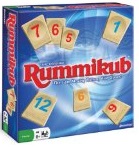
The game is based on the traditional middle-eastern game of Okey. First created in the 1930s and sold in hand-produced versions until the late 1970s.
Similar to the Rummy that you play with cards - you try to get rid of all your tiles by forming numbers into runs of 3 tiles or more, or 3 to 4 of a kind. The colors of the numbers on the tiles are like card suits. This game may start rather uneventfully, but when the players start putting more and more tiles in play, the options for your upcoming turns can become more complex, challenging, and exciting
Scattergories
2-6 Players · 30 Minutes · Party
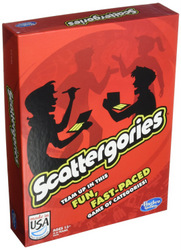
Do you have what it takes to be creative and think outside the box? The Scattergories game keeps you on your toes. Try to outwit other teams by coming up with unique answers in this fast-paced party game. Choose a category card, then roll the large 20-sided die and see which letter shows up. Race against the timer to think of answers for each category that begin with the letter on the die. Here's where it pays to be unique! You can only score points if your answers are different from the other teams'. The Scattergories game has over 3,500 possible category combinations, assuring you hours of fun!
The Game of Scattergories, published in 1988 by Milton Bradley, is a great game for any group to play. In the game each player fills out a category list 'with answers that begin with the same letter.' If no other player matches your answers, you score points. The game is played in rounds. After 3 rounds a winner is declared.
Scrabble
2-4 Players · 90 Minutes · Word

In this classic word game, players use their seven drawn letter-tiles to form words on the gameboard. Each word laid out earns points based on the commonality of the letters used, with certain board spaces giving bonuses. But a word can only be played if it uses at least one already-played tile or adds to an already-played word. This leads to slightly tactical play, as potential words are rejected because they would give an opponent too much access to the better bonus spaces.
Scythe
1-5 Players · 90-120 Minutes · Economic / Territory / War
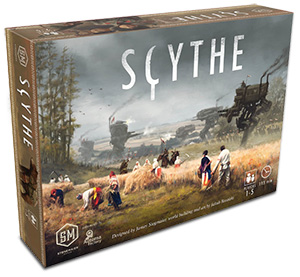
Scythe is a 4X board game set in an alternate-history 1920s period. It is a time of farming and war, broken hearts and rusted gears, innovation and valor. In Scythe, each player represents a character from one of five factions of Eastern Europa who are attempting to earn their fortune and claim their faction's stake in the land around the mysterious Factory. Players conquer territory, enlist new recruits, reap resources, gain villagers, build structures, and activate monstrous mechs.
Each player begins the game with different resources (power, coins, combat acumen, and popularity), a different starting location, and a hidden goal. Starting positions are specially calibrated to contribute to each faction's uniqueness and the asymmetrical nature of the game (each faction always starts in the same place).
Scythe gives players almost complete control over their fate. Other than each player's individual hidden objective card, the only elements of luck or variability are "encounter" cards that players will draw as they interact with the citizens of newly explored lands. Each encounter card provides the player with several options, allowing them to mitigate the luck of the draw through their selection. Combat is also driven by choices, not luck or randomness.
Resources: Rules
Invaders From Afar
1-7 Players · 90-140 Minutes · Economic / Territory / 4X
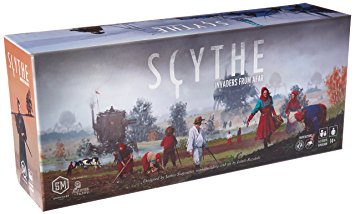
While empires rise and fall in Eastern Europa, the rest of the world takes notice. Two distant factions, Albion and Togawa, send emissaries to scout the land and employ their own distinct styles of conquering. Scythe: Invaders from Afar, an expansion for Scythe, adds two new factions: 10 miniatures, 62 custom wooden tokens, and 2 faction mats. It also includes some new cardboard tokens, two new player mats, six Automa cards, and a custom plastic insert designed to fit into the expansion box or the original Scythe box.
Resources: Rules
The Wind Gambit
1-7 Players · 90-140 Minutes · Economic / Territory / 4X
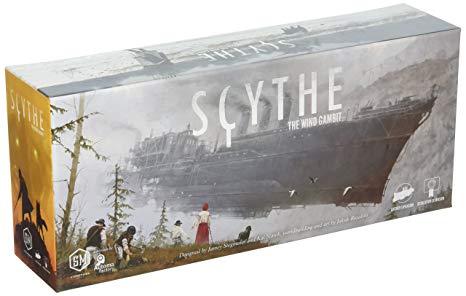
Scythe: The Wind Gambit, an expansion for Scythe, adds two new modules that can be played together or separately at any player count and with either the base game on its own or with other Scythe expansions:
· Airships: (1 miniature per faction; 16 tiles) An airship is a new type of unit that is distinctly different from characters, mechs, and workers. Unlike those units, airships never control territories. Airships are moved via a Move action, and rivers and lakes do not constrain their movement. Each airship has two randomly combined abilities (1 aggressive and 1 passive ability; same combo for all players).
· Resolutions: (8 tiles) The resolution module changes the way a game of Scythe ends. If you play with this module, ignore the standard end-game trigger (when a player places their sixth star, everything stops and the game ends). Instead, the resolution tile for the current game will determine when and how the game ends.
Resources: Rules
The Rise of Fenris
1-7 Players · 90-140 Minutes · Economic / Territory / 4X
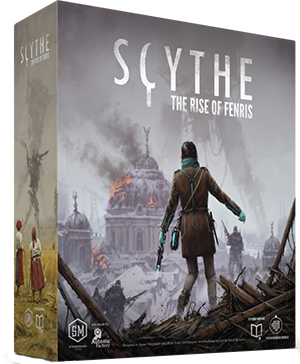
Empires have risen and fallen in the aftermath of the Great War, and Europa stands on the precipice of a new era. The economy is robust, morale is high, and defenses are strong. There are reports from the countryside of strange soldiers with glowing eyes, but they seem distant and harmless.
Scythe: The Rise of Fenris, the conclusion to the Scythe expansion trilogy, enables two different options for any player count (1-5 if you have Scythe; 1-7 players if you have Invaders from Afar):
Campaign (8 games): The story of Scythe continues and concludes with an eight-episode campaign. While the campaign includes surprises, unlocks, and persistent elements, it is fully resettable and replayable.
Modular (11 modules): Instead of—or after—the campaign, the new modules in The Rise of Fenris can be used in various combinations to cater to player preferences. These modules are compatible with all Scythe expansions, and they include a fully cooperative module.
Resources: Rules
Secret Hitler
5-10 Players · 30 Minutes · Card / Adult / Party

Secret Hitler is a dramatic game of political intrigue and betrayal set in 1930s Germany. Each player is randomly and secretly assigned to be a liberal or a fascist, and one player is Secret Hitler. The fascists coordinate to sow distrust and install their cold-blooded leader; the liberals must find and stop the Secret Hitler before it's too late. The liberal team always has a majority.
At the beginning of the game, players close their eyes, and the fascists reveal themselves to one another. Secret Hitler keeps his eyes closed, but puts his thumb up so the fascists can see who he is. The fascists learn who Hitler is, but Hitler doesn't know who his fellow fascists are, and the liberals don't know who anyone is.
Each round, players elect a President and a Chancellor who will work together to enact a law from a random deck. If the government passes a fascist law, players must try to figure out if they were betrayed or simply unlucky. Secret Hitler also features government powers that come into play as fascism advances. The fascists will use those powers to create chaos unless liberals can pull the nation back from the brink of war.
The objective of the liberal team is to pass five liberal policies or assassinate Secret Hitler. The objective of the fascist team is to pass six fascist policies or elect Secret Hitler chancellor after three fascist policies have passed.
Resources: Rules
Sector 6
1-4 Players · 30-60 Minutes · Strategy / Abstract / Maze
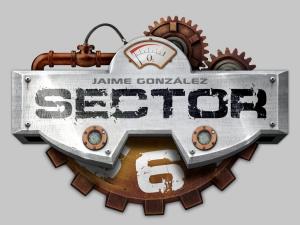
Sector 6 is an abstract strategy game for 1 to 4 players, with a playing time of 30 minutes. Each player controls two prisoners as they make their way through the winding labyrinth of a space prison, trying to collect enough oxygen to survive while denying their opponents the same. The goal is to collect as many points as possible (represented by oxygen tiles of different colors and values), located inside a maze formed by hexagonal tiles. Players must move across the maze and collect the points before their opponents.
The game has 2 phases: construction and competition. In the construction phase, players take turns placing tiles and creating the the board (maze). Then the competition phase begins, where players move around the maze attempting to collect more points (oxygen) than their opponents. Where players place their tiles is of utmost strategic importance in the construction phase: Sector 6´s building system allows strategic planning while the maze is being created. In the absence of a predefined configuration, each game takes place on an entirely new board. There are essentially an infinite amount of setup configurations which allows for high replay value.
But building a good maze and moving quickly will not be enough to achieve victory. During the game, Sector 6´s maze will be in constant motion, as players can rotate the tiles, thereby changing the layout of the maze, potentially allowing players to lock their opponents or create new pathways to reach the points faster. So it won't be the fastest player who wins, but the one who learns how to best use the intricacies of the maze to their own advantage and to the detriment of their opponents!
Resources: Rules
Snake Oil
3-10 Players · 30 Minutes · Party / Word

In the Old West, the wily snake oil salesman had a special talent, getting the most skeptical customers to buy the most dubious products. Now it's your turn! Invent your own zany two-word products - Rumor Mirror! Burp Balloon! - and sell them to all types of wacky customers. If the round's customer buys your product, you win!
To set up Snake Oil, each player takes six purple word cards. The customer for the round draws a customer card and announces it. Inventors quickly combine two purple word cards from their hand to form a crazy new product to sell to that customer. When ready, each inventor quickly pitches his or her product directly to the customer. The customer can end any pitch that goes longer than thirty seconds. The customer decides which product to buy and gives the inventor of that product the round's customer card as the prize. Inventors discard all used word cards and take two new word cards each. The player to the left of the customer becomes the next round's customer. Play repeats until each player has been the customer once.
Whoever collects the most customer cards wins.
Space Alert
1-5 Players · 30 Minutes · Cooperative / Realtime / Space
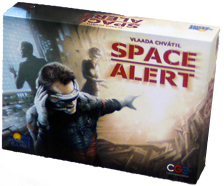
Space Alert is a cooperative team survival game. Players become crew members of a small spaceship scanning dangerous sectors of galaxy. The missions last just 10 real-time minutes (hyperspace jump, sector scan, hyperspace jump back) and the only task the players have is to protect their ship.
During play, the central computer will announce the presence of various threats on one the supplied 10 minute soundtracks that also acts as a game timer. The threats vary from space battleships and interceptors to different interstellar monsters and abominations, asteroids or even intruders and malfunctions on the spaceship. Players have to agree who will take care of which task and coordinate their actions (moving around the ship, firing weapons, distributing energy, using battlebots to deal with intruders, launching guided missiles, etc.) in real time to defend the ship. Only a well-working team can survive 10 minutes and make the jump back to safety.
The game offers several difficulty levels, huge variability and a unique experience for one to five player teams. One mission lasts only about 30 minutes, including setup and evaluation.
Space Alert
2 Players · 5-15 Minutes · Sci-Fi / Area Control
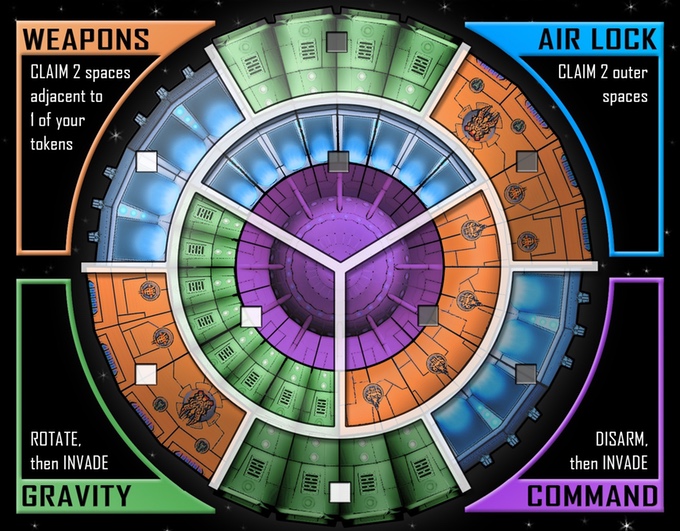
Command units with unique race powers to take over systems in the base. Then turn those systems against your opponent!
Space Base Mutiny is a fast-paced game with a sci-fi theme. The goal is simple; a player wins when he or she has used up all of her tokens. On your turn, you can use a unit to invade an enemy space OR remove a unit from a system you control to use that system's power. You then check to see which systems (if any) you gained control of.
Stones
2-5 Players · 60 Minutes · Dice / Chance

Based on an ancient Chinese dice game called Chin Chi Ro Rin, Stones involves rolling three six-sided dice in a wooden bowl and scoring the points. Players bet a chip or "potch" for each round, then take turns rolling the three dice. If any one of the dice slips out of the bowl, that player forfeits the round. Scoring takes place when two dice match in the bowl. This qualifies the third die for scoring, and the third die is the number of points the roller receives. The other players in the round must then roll to beat it, avoiding pitfalls like 1-1-1, 2-2-2 and 1-2-3. Likewise, if a player rolls 5-5-5 or 6-6-6 or 4-5-6, these are bonus rolls. The player left standing with all the potch wins.
Resources: Rules
Story Cubes (Rory's)
2-12 Players · 20 Minutes · Dice / Family
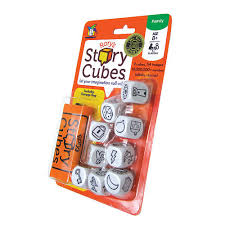
Here's a game that's enormous fun and will sharpen your wits and hone your imagination. The 54 images were designed by Rory O'Connor of Ireland, a trainer in creativity and creative problem-solving. They can be used to arrive at answers or decisions in an indirect and ingenious way.
Each jumbo 1-inch cube has 6 images or icons, with a total of 54 all-different hand-inlaid images that can be mixed in over 10 million ways. You roll all 9 cubes to generate 9 random images and then use these to invent a story that starts with "Once upon a time..." and uses all 9 elements as part of your narrative.
Play it as a game for one or more players, or as a party game for three or more. Or play it as an improv game where each player contributes part of the story, picking up where the last one left off. Win award points for speedy delivery, inventiveness, imagination, drama and humor.
Resources: Rules
Sushi Go!
2-5 Players · 20 Minutes · Card / Family
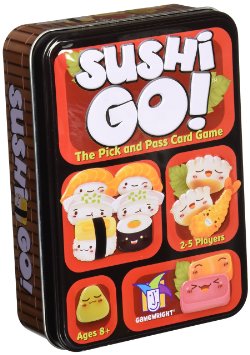
In the super-fast sushi card game Sushi Go!, you are eating at a sushi restaurant and trying to grab the best combination of sushi dishes as they whiz by. Score points for collecting the most sushi rolls or making a full set of sashimi. Dip your favorite nigiri in wasabi to triple its value! And once you've eaten it all, finish your meal with all the pudding you've got! But be careful which sushi you allow your friends to take; it might be just what they need to beat you!
Sushi Go! takes the card-drafting mechanism of Fairy Tale and 7 Wonders and distills it into a twenty-minute game that anyone can play. The dynamics of "draft and pass" are brought to the fore, while keeping the rules to a minimum. As you see the first few hands of cards, you must quickly assess the make-up of the round and decide which type of sushi you'll go for. Then, each turn you'll need to weigh which cards to keep and which to pass on. The different scoring combinations allow for some clever plays and nasty blocks. Round to round, you must also keep your eye on the goal of having the most pudding cards at the end of the game!
Resources: Rules
Taboo
4-10 Players · 20 Minutes · Party / Word

Taboo is a party word game. Players take turns describing a word or phrase on a drawn card to their partner without using five common additional words or phrases also on the card. The opposing partners watch a timer and use a buzzer to stop the game, buzz the player describing if one of the five off limits words or phrases is used, or the describing player makes any gestures. The describing team gets a point for each card they guess successfully and the opposing team gets a point for each card they pass on, make gestures on, or lose for saying one of the off limits words or phrases. An excellent party game!
Ticket to Ride
2-5 Players · 30-60 Minutes · Strategy / Family
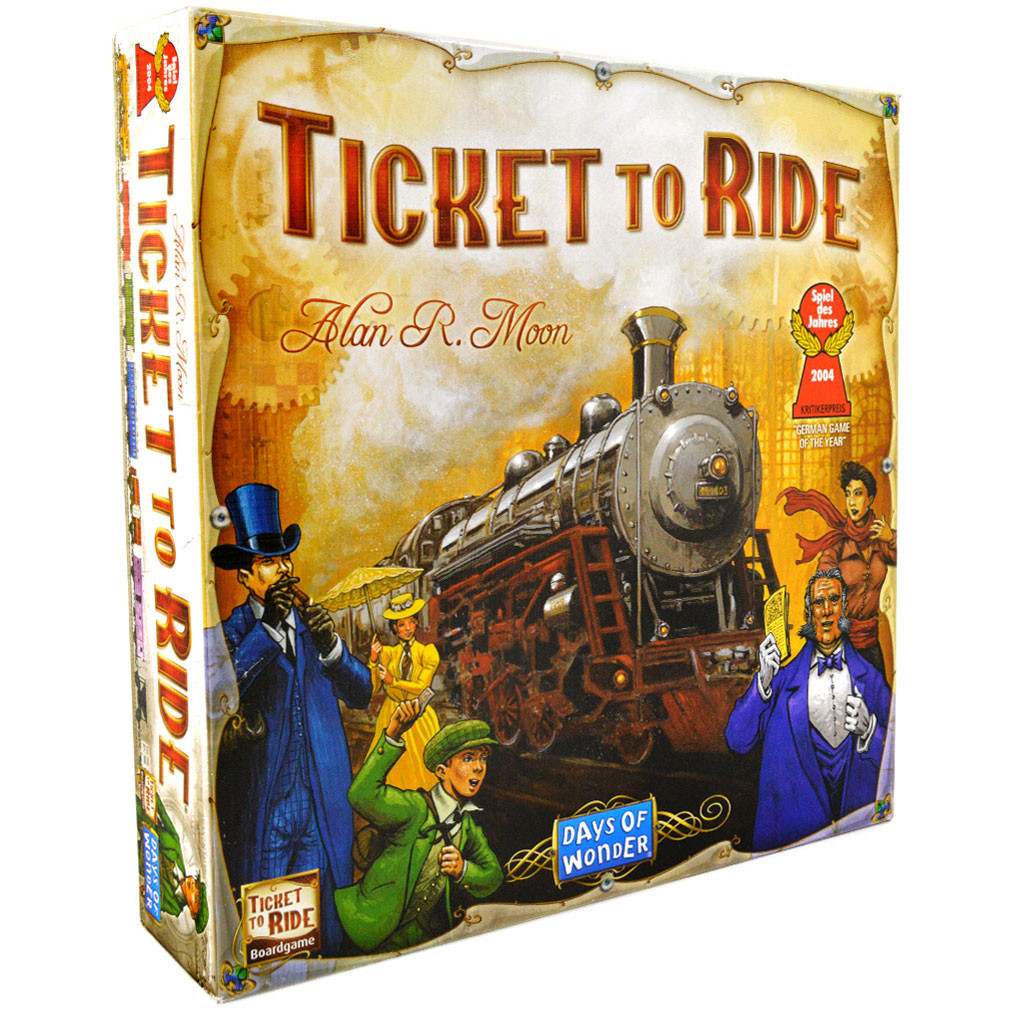
Ticket to Ride is a cross-country train adventure in which players collect and play matching train cards to claim railway routes connecting cities throughout North America.
The longer the routes, the more points they earn.
Additional points come to those who can fulfill their Destination Tickets by connecting two distant cities, and to the player who builds the longest continuous railway. Some railways have alternate routes available, and some of them are wild - any colored car can forge them. Players can cut off the route of an opponent and force him to take the long way around. But this is a double-edged sword because that gives the other player more points!
Resources: Rules
Ticket to Ride: Europe
2-5 Players · 30-60 Minutes · Strategy / Family
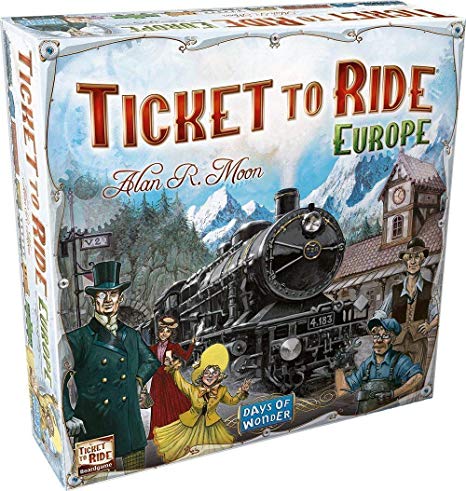
Ticket to Ride: Europe takes you on a new train adventure across Europe. From Edinburgh to Constantinople and from Lisbon to Moscow, you'll visit great cities of turn-of-the-century Europe. Like the original Ticket to Ride, the game remains elegantly simple, can be learned in 5 minutes, and appeals to both families and experienced gamers. Ticket to Ride: Europe is a complete, new game and does not require the original version.
More than just a new map, Ticket to Ride: Europe features brand new gameplay elements. Tunnels may require you to pay extra cards to build on them, Ferries require locomotive cards in order to claim them, and Stations allow you to sacrifice a few points in order to use an opponent's route to connect yours. The game also includes larger format cards and Train Station game pieces.
The overall goal remains the same: collect and play train cards in order to place your pieces on the board, attempting to connect cities on your ticket cards. Points are earned both from placing trains and completing tickets but uncompleted tickets lose you points. The player who has the most points at the end of the game wins.
Resources: Rules
T.I.M.E Stories
4 Players · 60-90 Minutes · Cooperative / Adventure / Time Travel
The Marcy Case
A Prophecy of Dragons
Under The Mask
Expedition: Endurance
Lumen Fidei

The T.I.M.E Agency protects humanity by preventing temporal faults and paradoxes from threatening the fabric of our universe. As temporal agents, you and your team will be sent into the bodies of beings from different worlds or realities to successfully complete the missions given to you. Failure is impossible, as you will be able to go back in time as many times as required.
T.I.M.E Stories is a narrative game, a game of "decksploration". Each player is free to give their character as deep a "role" as they want, in order to live through a story, as much in the game as around the table. But it's also a board game with rules which allow for reflection and optimization.
At the beginning of the game, the players are at their home base and receive their mission briefing. The object is then to complete it in as few attempts as possible. The actions and movements of the players will use Temporal Units (TU), the quantity of which depend on the scenario and the amount of players. Each attempt is called a "run"; one run equals the use of all of the Temporal Units at the players' disposal. When the TU reach zero, the agents are recalled to the agency, and restart the scenario from the beginning, armed with their experience.
Resources: Rules
T.I.M.E Stories: The Marcy Case
4 Players · Cooperative / Adventure / Time Travel
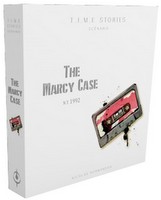
A little girl has gone missing and a sleepy American town is struggling to deal with the loss. It's up to you and your team of Temporal Agents to not only find the girl, but also combat a strange plague sweeping the countryside. The Marcy Case is the first expansion to the revolutionary, T.I.M.E. Stories system. Players will travel back to 1992 in an attempt to avert a crisis. Every move costs you time and time is in short supply. If you can't solve this case before the clock ticks down to zero you'll have to return to your starting point for another attempt. The Marcy Case is a completely immersive adventure, where every decision you make can be the difference between life or death!
Two decks come with this expansion, and it uses the existing components of the parent game. This makes the possibility of expansions basically unlimited, as all you need to expand it are more decks.
T.I.M.E Stories: A Prophecy of Dragons
4 Players · Cooperative / Adventure / Time Travel
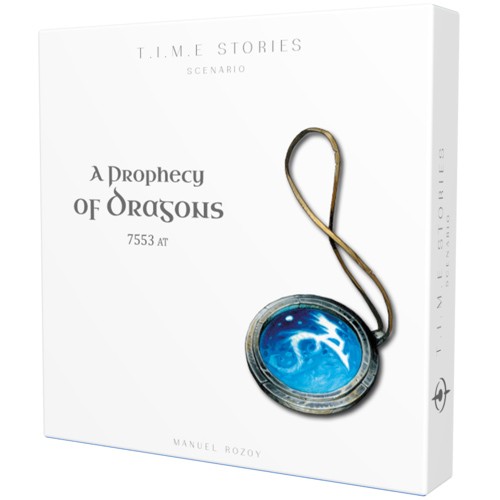
7553 AT (Alternative Timeline): Forget all you know about the Middle Ages, and explore a new reality in which magic changes everything.
Three decks come with this expansion, and it uses the existing components of the parent game. This makes the possibility of expansions basically unlimited, as all you need to expand it are more decks.
T.I.M.E Stories: Under The Mask
4 Players · Cooperative / Adventure / Time Travel

Enter the Valley of the Kings and unravel a pharaoh's secret. Under the Mask is the third expansion for T.I.M.E Stories, the cooperative game of time travel, alternate realities, and unlimited discovery. This time, you and your fellow temporal agents must travel back to ancient Egypt to solve a crime that threatens to destabilize the future.
With its 142 new cards, Under the Mask immerses you in an age of wonder and intrigue, and for the first time as you explore this historical world, you'll be able to take advantage of the instantaneous transfers permitted by your team's Instantaneous Transfer Device!.
T.I.M.E Stories: Expedition: Endurance
4 Players · Cooperative / Adventure / Time Travel
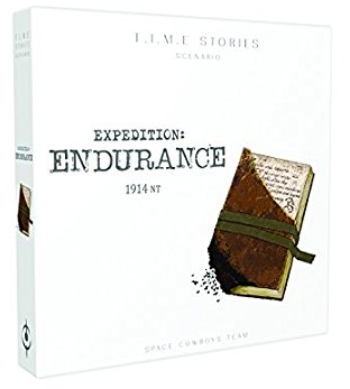
7553 AT (Alternative Timeline): Forget all you know about the Middle Ages, and explore a new reality in which magic changes everything.
Three decks come with this expansion, and it uses the existing components of the parent game. This makes the possibility of expansions basically unlimited, as all you need to expand it are more decks.
T.I.M.E Stories: Lumen Fidei
4 Players · Cooperative / Adventure / Time Travel
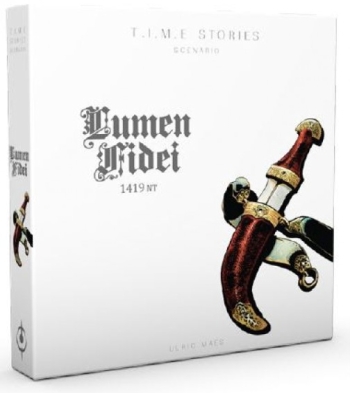
7553 AT (Alternative Timeline): Forget all you know about the Middle Ages, and explore a new reality in which magic changes everything.
Three decks come with this expansion, and it uses the existing components of the parent game. This makes the possibility of expansions basically unlimited, as all you need to expand it are more decks.
Twilight Imperium
3-6 Players · 180-240 Minutes · Strategy / War / 4X
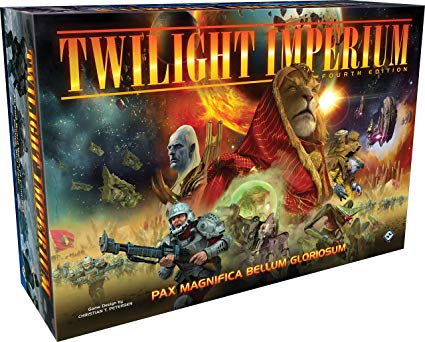
Twilight Imperium Third Edition is an epic empire-building game of interstellar conflict, trade, and struggle for power. Players take the roles of ancient galactic civilizations, each seeking to seize the imperial throne via warfare, diplomacy, and technological progression. With geomorphic board tiles, exquisite plastic miniatures, hundreds of cards, and introducing a rich set of strategic dimensions that allows each player to refocus their game-plan, the original designer Christian T. Petersen has seamlessly incorporated the better qualities of other recently popular games to improve on the game-play of the original TI, making it at once perfectly well-rounded and pleasantly familiar to experienced gamers.
TI3 is played by at least three players who belong to ten possible alien races, each with their own advantages and quirks. The 'designer notes' in the rulebook candidly and humbly acknowledge the inspiration for some of the improvements to the original game. The strategic game-play borrows the governing element from 'Puerto Rico' to involve players in an iteratively complex and yet fast-paced game experience with very little downtime. The game map, basic player progress and overall victory are dynamically determined in almost exactly the same way as they are by imaginative players of 'Settlers of Catan', while the "Command" system cleverly improves on the 'oil' logistical mechanism of 'Attack' to both manage turn-based activity and limit the size of armies, uniquely enabling weakened players to bounce back if they play their cards right.
Resources: Rules
Terraforming Mars
1-5 Players · 90-120 Minutes · Economic / Sci-Fi / Territory
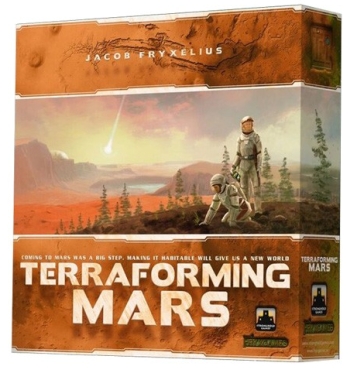
In the 2400s, mankind begins to terraform the planet Mars. Giant corporations, sponsored by the World Government on Earth, initiate huge projects to raise the temperature, the oxygen level, and the ocean coverage until the environment is habitable. In Terraforming Mars, you play one of those corporations and work together in the terraforming process, but compete for getting victory points that are awarded not only for your contribution to the terraforming, but also for advancing human infrastructure throughout the solar system, and doing other commendable things.
The players acquire unique project cards (from over two hundred different ones) by buying them to their hand. The projects (cards) can represent anything from introducing plant life or animals, hurling asteroids at the surface, building cities, to mining the moons of Jupiter and establishing greenhouse gas industries to heat up the atmosphere. The cards can give you immediate bonuses, as well as increasing your production of different resources. Many cards also have requirements and they become playable when the temperature, oxygen, or ocean coverage increases enough. Buying cards is costly, so there is a balance between buying cards (3 megacredits per card) and actually playing them (which can cost anything between 0 to 41 megacredits, depending on the project). Standard Projects are always available to complement your cards.
Your basic income, as well as your basic score, is based on your Terraform Rating (starting at 20), which increases every time you raise one of the three global parameters. However, your income is complemented with your production, and you also get VPs from many other sources.
Resources: Rules
Hellas & Elysium
1-5 Players · 90-120 Minutes · Economic / Sci-Fi / Territory
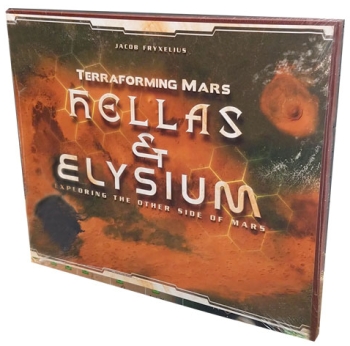
Terraforming Mars: Hellas & Elysium, the first expansion for Terraforming Mars, consists of a double-sided game board presenting two new areas of Mars:
· Elysium takes players almost to the opposite side of Mars' equator, with vast lowlands for oceans in the north and a dry, mineral-rich south. Place a tile on Olympus Mons, the highest peak in the solar system, to gain three free cards!
· Hellas, the southern wild, includes Mars' south pole and the enormous seven-hex Hellas crater that just begs to become a giant lake. Building around the pole gives you new placement bonuses in the form of heat and possibly even water.
Each of these maps consists of new sets of milestones and awards with relevance for that particular map. Place three tiles around the south pole to be a Polar Explorer, for example, or race to have the most estates beside water on Elysium!
Venus Next
1-5 Players · 90-120 Minutes · Economic / Sci-Fi / Territory
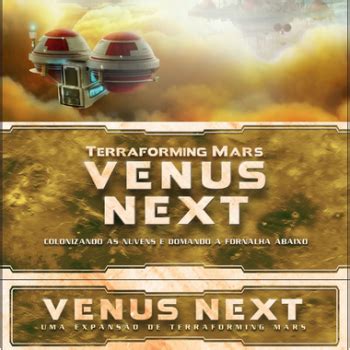
Terraforming Mars: Venus Next, the second expansion for the Terraforming Mars base game, has players building flying cities and making the atmosphere more hospitable on the deadly planet Venus. In Venus Next, the World Government chooses to also fund the terraforming of Venus. Around 50 project cards and 5 corporations are added, with a special focus on how to make Venus habitable. With the new floater resource, a new milestone, a new award, a new tag, and a new terraforming parameter, players are given more paths to victory and an even more varied play.
Prelude
1-5 Players · 90-120 Minutes · Economic / Sci-Fi / Territory
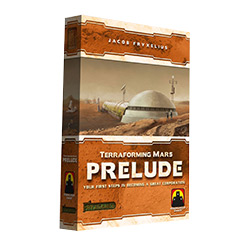
As the mega corporations are getting ready to start the terraforming process, you now have the chance to make those early choices that will come to define your corporation and set the course for the future history of Mars - this is the prelude to your greatest endeavors!
In Terraforming Mars: Prelude, you get to choose from Prelude cards that jumpstart the terraforming process, or boost your corporation engine. There are also 5 new corporations, and 7 project cards that thematically fit the early stages of terraforming.
Prelude is an expansion to Terraforming Mars, and can be combined with any other Terraforming Mars expansion or variant.
Tokaido
2-5 Players · 45 Minutes · Family / Travel
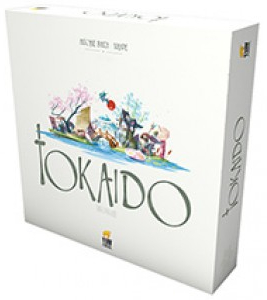
In Tokaido, each player is a traveler crossing the "East sea road", one of the most magnificent roads of Japan. While traveling, you will meet people, taste fine meals, collect beautiful items, discover great panoramas, and visit temples and wild places but at the end of the day, when everyone has arrived at the end of the road you'll have to be the most initiated traveler - which means that you'll have to be the one who discovered the most interesting and varied things.
The potential action spaces in Tokaido are laid out on a linear track, with players advancing down this track to take actions. The player who is currently last on the track takes a turn by advancing forward on the track to their desired action and taking that action. So, players must choose whether to advance slowly in order to get more turns, or to travel more rapidly to beat other players to their desired action spaces.
Resources: Rules
Twilight Struggle
2 Players · 180 Minutes · Strategy / War
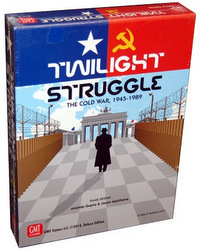
Twilight Struggle inherits its fundamental systems from the card-driven classics We the People and Hannibal: Rome vs. Carthage. It is a quick-playing, low-complexity game in that tradition. The game map is a world map of the period, whereon players move units and exert influence in attempts to gain allies and control for their superpower. As with GMT's other card-driven games, decision-making is a challenge; how to best use one's cards and units given consistently limited resources?
Twilight Struggle's Event cards add detail and flavor to the game. They cover a vast array of historical happenings, from the Arab-Israeli conflicts of 1948 and 1967, to Vietnam and the U.S. peace movement, to the Cuban Missile Crisis and other such incidents that brought the world to the brink of nuclear annihilation. Subsystems capture the prestige-laden Space Race as well as nuclear tensions, with the possibility of game-ending nuclear war.
Resources: Rules
Uno
2-10 Players · 30 Minutes · Family / Card

Players race to empty their hands and catch opposing players with cards left in theirs, which score points. In turns, players attempt to play a card by matching its color, number, or word to the topmost card on the discard pile. If unable to play, players draw a card from the draw pile, and if still unable to play, they pass their turn. Wild and special cards spice things up a bit.
UNO is a commercial version of Crazy Eights, a public domain card game played with a standard deck of playing cards.
Village
2-4 Players · 60-90 Minutes · Strategy / Farming / Medieval
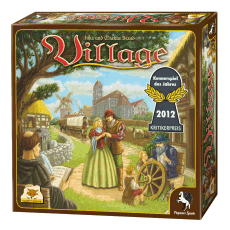
Life in the village is hard - but life here also allows the inhabitants to grow and prosper as they please. One villager might want to become a friar. Another might feel ambitious and strive for a career in public office. A third one might want to seek his luck in distant lands.
Each player will take the reins of a family and have them find fame and glory in many different ways. There is one thing you must not forget, however: Time will not stop for anyone and with time people will vanish. Those who will find themselves immortalized in the village chronicles will bring honor to their family and be one step closer to victory.
Village is a game full of tactical challenges. A smart and unique new action mechanism is responsible for keeping turns short and yet still tactically rich and full of difficult decisions. Also unique is the way this game deals with the delicate subject of death; as a natural and perpetual part of life in the village, thoughts of death will keep you focused on smart time-management.
Resources: Rules
Viticulture
1-6 Players · 90 Minutes · Strategy / Economic / Worker Placement
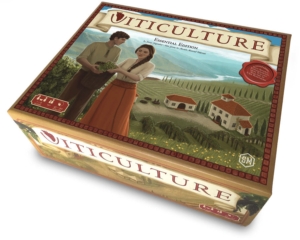
In Viticulture, the players find themselves in the roles of people in rustic, pre-modern Tuscany who have inherited meager vineyards. They have a few plots of land, an old crushpad, a tiny cellar, and three workers. They each have a dream of being the first to call their winery a true success.
The players are in the position of determining how they want to allocate their workers throughout the year. Every season is different on a vineyard, so the workers have different tasks they can take care of in the summer and winter. There's competition over those tasks, and often the first worker to get to the job has an advantage over subsequent workers.
Fortunately for the players, people love to visit wineries, and it just so happens that many of those visitors are willing to help out around the vineyard when they visit as long as you assign a worker to take care of them. Their visits (in the form of cards) are brief but can be very helpful.
Resources: Rules
Tuscany
1-6 Players · 60-150 Minutes · Strategy / Economic / Worker Placement
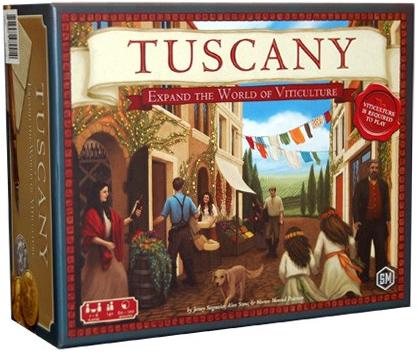
Tuscany Essential Edition features three expansions to Viticulture: the extended board (and 36 wooden stars), structure cards/mats, and special workers (14 meeples instead of the 66 in the original Tuscany, but gameplay is the same). All other expansions in the original Tuscany will go out of print.
Tuscany Essential Edition is recommended for use with Viticulture Essential Edition, but older versions of Viticulture will work fine too.
Resources: Rules
Moor Visitors
1-6 Players · 60-150 Minutes · Strategy / Economic / Worker Placement
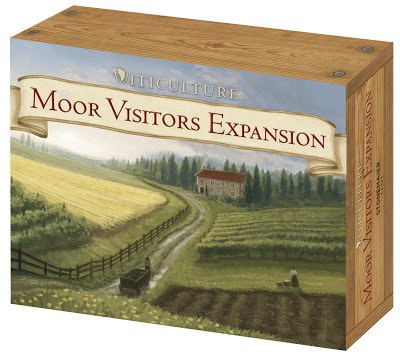
The Viticulture Moor Visitors Expansion, designed by famed designer Uwe Rosenberg (Agricola, Caverna, Patchwork) and Viticulture designers Jamey Stegmaier and Alan Stone, adds 40 new visitors to any version of Viticulture. Also included are corrected reprints of the Promoter and Harvest Machine cards.
Copy Signed by Designer: Wow, Brian, you went all-out on Stonemaier stuff! Thanks for giving those games a shot. :) Viticulture does have a small expansion called Moor Visitors that I don't see there. I'd like to send you a signed copy of it in appreciation for your trust and support of Stonemaier products (and that you supported a local game store!). Could you send me your address?
Best,
Jamey
Yahtzee
2-10 Players · 30 Minutes · Dice / Chance
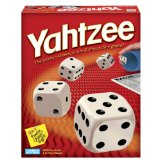
Yahtzee is a classic dice game played with 5 dice. Each player's turn consists of rolling the dice up to 3 times in hope of making 1 of 13 categories. Examples of categories are 3 of a kind, 4 of a kind, straight, full house, etc. Each player tries to fill in a score for each category, but this is not always possible. When all players have entered a score or a zero for all 13 categories, the game ends and total scores are compared.
Wizard School
2-5 Players · 30 Minutes · Card / Fantasy / Cooperative

Wizard School is like normal school, except it's a card game where you have to carefully manage your abilities and resources to make sure that you don't flunk out of the most prosaic magical academy in all the world.
Wizard School is a cooperative card game in which 2-5 players take turns at passing tests, besting monsters in the most epic group project of all time. And yes, you are graded cumulatively. When one of you fails, you all flunk out.
Difficulty and length of games can be managed by choosing from among 20 different graduation cards, which helps ensure that each game is a new experience.
Your goal may be to graduate, but you can't let the monsters overrun the school. As they pile up, you're forced to use your magic just to stay alive, and you may have nothing left to pass the Graduation Milestones. If you reach an F (on the Graduation Card), it's Game Over.
Resources: Rules
Would You Rather?
2-10 Players · 30 Minutes · Card / Adult / Party
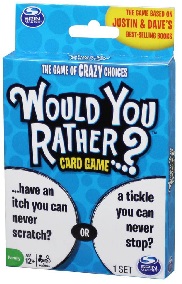
Players must pick a card and present the rest of the players with a nasty choice between two thoroughly unpleasant hypotheticals. Typical choices on the cards include, "Would you rather lie naked in a bathtub full of live roaches or dive head first into a pool of tobacco spit?" The answer "neither" is NEVER allowed. There is no wrong answer, and no points are kept, so there is no clear winner. But as you'll find if you play long enough, everyone loses.
You're Fired
2-4 Players · 20 Minutes · Card / Deduction / Humor
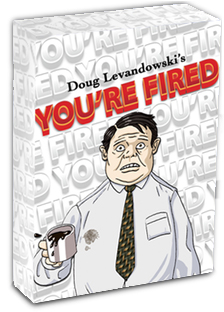
Well, the inevitable has happened: the company you work for has been acquired by a transnational corporation, and they've decided that your division is redundant. Because you are. So, your incompetent boss has asked you, as the smartest person in your division, to help make sure your division looks busy and survives.
You're Fired! is a quick two to four player game where opponents compete to be the first to get their opponent's boss fired. By playing various employees, from the Axe Man to the Fall Guy, you can work to make sure that your division makes it through the merger.
Games for Children

Apples to Apples
Candyland
Chutes & Ladders
Fact or Crap
Gubs
Monster Café
Old Maid
Operation
The T-Shirt Game
Apples to Apples
4-10 Players · 30 Minutes · Card / Humor / Party
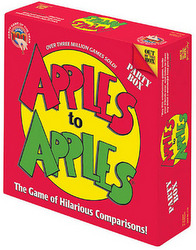
The party game Apples to Apples consists of two decks of cards: Things and Descriptions. Each round, the active player draws a Description card (which features an adjective like "Hairy" or "Smarmy") from the deck, then the other players each secretly choose the Thing card in hand that best matches that description and plays it face-down on the table. The active player then reveals these cards and chooses the Thing card that, in his opinion, best matches the Description card, which he awards to whoever played that Thing card. This player becomes the new active player for the next round.
Once a player has won a pre-determined number of Description cards, that player wins.
Candyland
2-4 Players · 30 Minutes · Children's / Racing
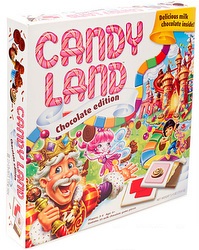
A child can begin by just recognizing basic colors. Each player advances along the rainbow path through the peppermint stick forest, the gingerbread plum tree and the gumdrop mountain. The players use the plastic gingerbread man as the playing pieces. There are colorful pieces in four colors and cards.
"The Legend of the Lost Candy Castle" is printed inside the box and can be read out loud. The game parts can be stored below it. The game board is colorful and has lots of yummy candy references. You play the game by moving the gingerbread playing pieces on the gameboard spaces that match the colors and pictures of the drawn cards. The object is to be the first player to reach the candy castle. There are specific directions to play. You can play with one color block, two color blocks and picture cards. If you are the first person to reach the last purple space, or move beyond the last purple space, you reach candy castle and have won the game. There are barriers along the way, like the gooey gumdrops, getting lost in the lollipop woods, or stuck in the molasses swamp.
Chutes and Ladders
2-6 Players · 30 Minutes · Card / Adult / Party
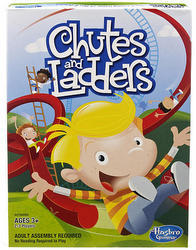
Traditional game from ancient India was brought to the UK in 1892 by the name of Snakes and Ladders and first commercially published in the USA by Milton Bradley in 1943 (as Chutes and Ladders). Players travel along the squares sometimes using ladders, which represent good acts, that allow the player to come closer to nirvana while the snakes were slides into evil.
In this particular version, players draw cards with one or two colored squares on them, representing how far to move on the game board. Look out for chutes, but try to land on the ladders to advance to higher levels faster.
Fact or Crap
3-8 Players · 30 Minutes · Party / Trivia / Card
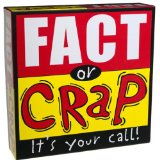
Basic trivia game where players try to figure out if a statement is a Fact, or just a load of Crap.
After the Reader has read the question, the other players have to decide as fast as they can whether the answer is Fact or Crap. The players indicate their answer by putting face-down either their Fact card or Crap card. The Reader then determines which player was the first to put his Answer card down. Once all of the Answer cards are down, the player who was first to answer turns over his Answer card. If the answer is correct, they receive 2 tokens from the middle pile. The Reader will then turn the other Answer cards over. All other players with the correct answer will receive 1 token. All players with the wrong answer (including the player who puts their Answer card down first) will have to put 1 token back in the middle pile. The Reader's turn is complete when all 3 questions have been read.
During the game you will randomly draw Rush Hour cards. The Reader who picks up a Rush Hour card may nominate any player to answer the Rush Hour questions. Once the nomination has been made, the egg timer is turned over and the Reader begins to read the questions. The aim is to have all 5 questions asked and answered within the time limit so that both Reader and the answering player have a chance to win as many extra tokens as possible.
Gubs
2-6 Players · 30 Minutes · Card / Children's / Party
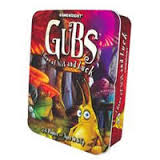
GUBS: A Game of Wit and Luck invites you to partake in the secret struggle of the Gubs. Each player competes to build the largest, strongest colony by the time the three dreaded Letter Cards emerge from the deck and end the game. Their world is a place filled with danger; from giant Omen Beetles who consume the delicate Gub Cities to Flash Floods to deadly Wasps, your gubs hardly stand a chance on their own... but arm them with Spears, let ride the valiant Toad Riders, build Mushroom Barricades and lead your colony through the forest underbrush and to victory.
Wit and Luck. You'll need them both. The gubs are counting on you.
Monster Café
2-4 Players · 20 Minutes · Card / Children's
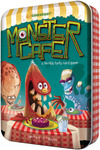
Make a reservation for ewww at the Monster Café! Play cards to seat hungry monsters around tables filled with such revolting refreshments as Roasted Roadkill, Boiled Brains, and Stinky Sock Stew - but be careful as these monsters are extremely picky eaters. Feed them what they fancy, or else they may take a bite out of your score! Oh, and whatever you do, avoid the lemon sorbet!
Players seat monsters around tables of like kinds, trying to get rid of as many as possible from their hands. Then they collect tables full of monsters for points. The Lemon Sorbet card wipes out an entire hand at once.
Old Maid
2-5 Players · 5 Minutes · Card / Children's
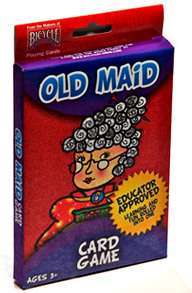
In the end, all cards except the "old maid" (the one queen left in the deck) will be down in pairs. Whoever holds that card loses! Everybody else wins!
The best part of this game is seeing another player draw the old maid away from you. You're supposed to keep it a secret when this happens (because other players will avoid drawing from the victim if they know that they risk the old maid by doing so), but young children usually laugh or gloat when the old maid gets taken from them. Adults playing can make the victim feel better by trying to draw the maid away from them.
Operation
1-6 Players · 10 Minutes · Children's / Dexterity

Operation is a dexterity game in which you must extract silly body parts from a hapless patient. In the course of the game you acquire cards which dictate that you must remove a certain piece from the body of the patient. To do this you use a set of tweezers that are attached by wire to the game board. If you are sloppy and touch the metal sides of the hole where the item is located, the patient's pain is indicated by a sudden buzzer and light-up nose. Successful extractions net cash, and the player with the most cash at the end of the game is the winner.
This game has been known to cause stress in children's lives and turn them into stressed-out, paranoid, freakish adults when they grow up. Careful with who you allow to play this crap
The T-Shirt Game
3-6 Players · 30 Minutes · Card / Humor / Party
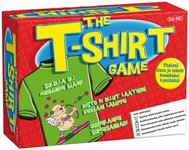
The T-Shirt Game is the fashionable party game "wear" funny matters! Create your own T-shirt by matching ridiculous slogans to outrageous images. To create these laughable masterpieces, the "judge plays a T-Shirt Card, while everyone else throws in the best Slogan Card. Whether it's funny, to the point, irrelevant, or irreverent, if the "judge" likes it, you win points.
Match ridiculous slogans to outrageous images, and create your own zany t-shirts. So much fun, even monkeys* love to play!
Similar mechanics as in Apples to Apples. Players take turns as "The Judge", while the other players match slogan cards to cartoon images on a t-shirt card. Winning matches score point cards with varying amounts. First one to 3000 points is the winner.